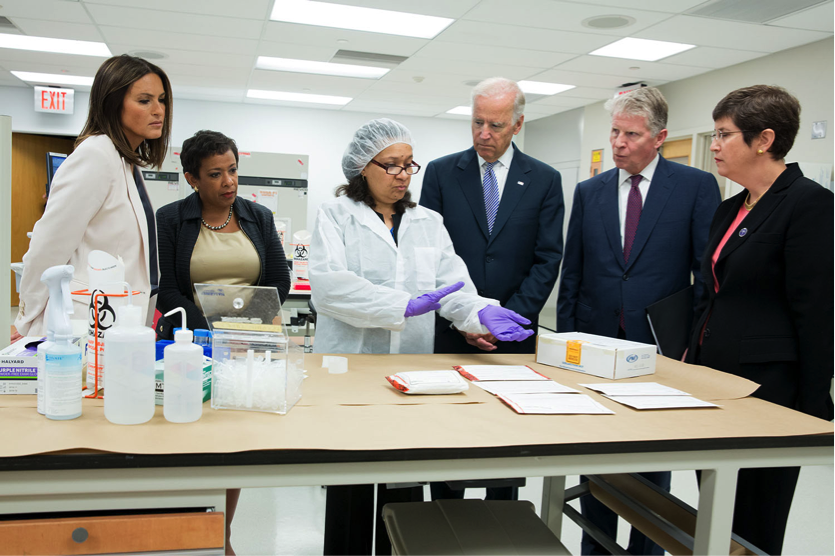
Earlier this month, the Department of Justice’s Bureau of Justice Assistance (BJA) announced the release of the FY2016 National Sexual Assault Kit Initiative (SAKI) grant solicitation. A landmark program of the Obama-Biden Administration, the $45 million SAKI program will support a community-based response to ending the rape kit backlog in the United States.
Check out White House Senior Advisor Valerie Jarrett’s tweet about the 2016 SAKI announcement:
Great news - @TheJusticeDept announces National Sexual Assault Kit Initiative grants #TestTheKits https://t.co/ckn3vXYiP2
— Valerie Jarrett (@vj44) March 1, 2016
What is the “rape kit backlog”?
The sexual assault kit backlog, colloquially known as the “rape kit backlog,” refers to untested rape kits that have not been submitted for testing by police. Over the past decade, tens of thousands of untested kits have been found in evidence rooms and warehouses across the country. Those kits are not merely numbers. As Vice President Joe Biden has said, “behind every single one of those rape kits is a victim who deserves recognition and justice.”
What is a rape kit?
After surviving a sexual assault, a victim may seek medical care and choose to have any evidence left on her clothes or body collected by a healthcare professional. This forensic medical exam usually takes four to six hours. The collected evidence is placed in a kit, which is one investigative tool that may help police and prosecutors identify the offender and find connections to other pending cases.
Imagine the sense of injustice that victims may feel upon learning that the invasive evidence collection process they underwent resulted in their rape kit sitting, untested, on a shelf for months, years, or even decades.
That is why the Obama-Biden Administration has taken decisive action to test the unsubmitted kits, provide services for the thousands of victims whose rape kits have been shelved, and understand the problem’s root causes – in order to improve the criminal justice system’s response and prevent future backlogs. Last September, the Vice President and Attorney General Loretta Lynch announced the $41 million FY2015 SAKI program, which awarded 20 grants to jurisdictions across the country to get more kits tested, improve investigations, enhance prosecutions, and develop victim-centered protocols for interviewing and notifying victims.


Lessons Learned: Detroit, New York City, and Beyond
We have learned much from SAKI grantees like Detroit, which piloted a DOJ-funded action research study to study rape kit backlogs. In 2009, the Wayne County Prosecutor's Office discovered more than 11,000 untested rape kits in a Detroit Police Department storage facility. As of January 2016, Detroit has tested approximately 10,000 kits, resulting in 2,616 DNA matches, the identification of 729 potential serial rapists, and 36 convictions. DNA from the tested kits linked to crimes committed in 40 states.
The Detroit study, which was conducted between 2011-13 and published in 2015, found that in many cases, law enforcement closed investigations after minimal effort and “expressed negative, victim-blaming beliefs about sexual assault victims”—e.g., that adolescents lie, that acquaintance rape victims “got-what-they-got” because they associated with the perpetrator, and that prostitutes who claimed they were raped were merely complaining of a “deal gone bad.” However, when confronted with the data from the tested kits—especially the kits where the offender was known to the victim—police officers were stunned. “[T]he way we’ve been thinking about this [i.e. not testing kits when acquaintance rape is alleged and the offender is known] was wrong. Flat out wrong,” one police officer said. As a result of the findings, Detroit police asked for and received training on trauma-informed approaches to interviewing victims of sexual assault, and how these approaches could result in more effective investigations and prosecutions.
The Manhattan District Attorney’s office also offers a promising example of a creative approach to addressing challenges posed by statutes of limitations in sexual assault cases involving a rape kit. Between 1999 and 2003, the office cleared New York City’s 17,000 rape kit backlog, resulting in over 2,000 DNA matches, 200 arrests, 49 indictments, and 1 exoneration based on DNA cold case hits. Using a method first established by the DA’s office in Milwaukee, the Manhattan DA indicted the unidentified DNA profiles developed from previously dormant rape kits as “John Does,” thereby stopping the clock on the statute of limitations. As of last September, the Office had indicted 24 of these “John Doe” DNA profiles – 18 of which were still waiting for a DNA match to enter the system. Other law enforcement agencies might look to the Manhattan DA’s approach as an example of what they can do when they have strong evidence of a sexual assault with a defendant only known by DNA. This approach can provide survivors hope that perpetrators will eventually get caught and brought to justice.
Detroit and New York aren’t alone. Across the country, law enforcement, prosecutors, legislators, and victim advocates are working together to create protocols for the quick processing of DNA evidence, coordinated actions including arrests and investigations, and survivor-focused, trauma-informed engagement with victims who have long awaited justice. The International Association of Chiefs of Police recently submitted a resolution that law enforcement agencies should implement training on the crime of sexual assault, its impact on victims, sex offender recidivism, and the importance of DNA evidence.
SAKI 2016
The 2016 SAKI program aims to facilitate this shift in law enforcement response to sexual assault cases. SAKI grant funding may be used to inventory and test unsubmitted SAKs, pursue new investigative leads and prosecutions, and support victims throughout the investigation and prosecution process. Grants may also be used to develop evidence-tracking systems, train law enforcement, conduct research on outcomes in sexual assault cases, and increase collection of offender DNA to upload into the FBI’s Combined DNA Index System (CODIS), which may lead to the identification of serious and serial sex offenders.
The goals of the SAKI program are straightforward and holistic:
- To reduce the number of unsubmitted sexual assault kits;
- To improve training to ensure victim-centered responses;
- To strengthen advocacy resources;
- To improve the understanding of the nature and extent of the sexual assault problem;
- To establish evidence tracking, case management, and victim notification protocols; and
- To establish protocols that address the root causes that originally caused these kits to remain shelved and unsubmitted.
The root causes question is complex and critically important. The National Institute of Justice points to factors such as victim-blaming beliefs and behaviors, the lack of written policies and protocols for submitting kits to labs, budget cuts, high turnover in police leadership, and strained relationships and lack of training among the necessary partners, as “risk factors” that can contribute to a rape kit backlog. In order to determine the root causes of the rape kit backlog problem, applicants are encouraged to consider how the Justice Department’s recently-released guidance on “Identifying and Preventing Gender Bias in Law Enforcement Response to Sexual Assault and Domestic Violence” can enhance law enforcement response to sexual assault victims and optimize investigations.
Additional Information
FY2016 Sexual Assault Kit Initiative grant applications are due on April 26, 2016. For more information on applying for SAKI grants,
- Visit https://www.bja.gov/funding/SAKI16.pdf, and
- View BJA’s webinar about the application process here.
For more information on the sexual assault kit backlog, please visit the National Institute of Justice’s website: http://www.nij.gov/topics/law-enforcement/investigations/sexual-assault/Pages/untested-sexual-assault.aspx


